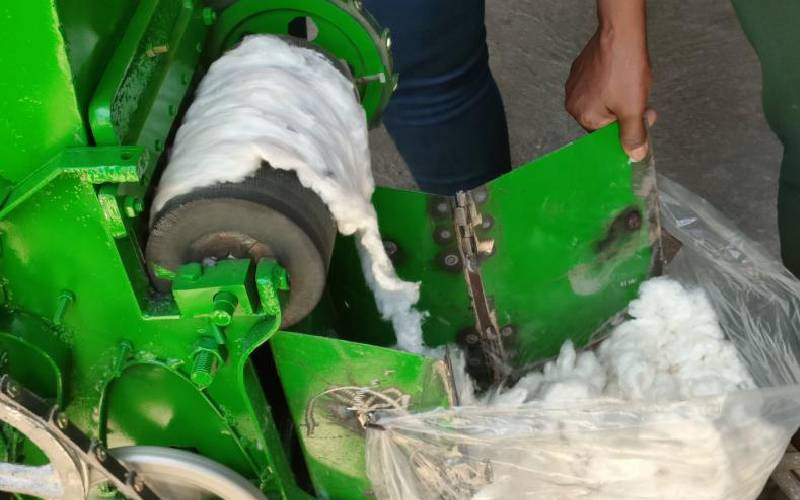 |
|
Sugarcane is one of the most important crops in the economy alongside tea, coffee, horticulture and maize. [PHOTO:JULIUS JENIPHER WACHIE /STANDARD] |
By Carol Kariuki
I have been following with keen interest the ongoing debate surrounding a recent court ruling in which four Coca-Cola bottlers have been asked to pay a whopping Kshs 5.6 billion to the Kenya Revenue Authority (KRA).
This is by no means a small amount for any business, which makes the case interesting. But since this case is in court, I do not want to dwell on its merits and demerits, however, the socio-economic ramifications of this ruling portend a disastrous result for the operations of these business enterprises, which must now be mulling over how to close business soon if this tax demand has to be met.
As an advocate of clear law and policy framework within which our private sector organisations operate, Kenya Private Sector Alliance (KEPSA) is well aware of the multi-faceted issues affecting the general business climate in Kenya, a big chunk of which is made up of the private sector. So this case has not surprised us - our worry lies in the disconcerting trend where the taxman seems to be considering it more important to milk the cow dry than feed it.
Taxation has brought about protracted issues for many businesses. There is a valid point in KRA widening the tax bracket and collecting what is due to Caesar. For, the benefits of the country’s economic expansion resulting from increased expenditure in areas such as roads, railway and technology, cannot be gainsaid. To be fair, a good proportion of these funds have been raised locally and the private sector has benefitted significantly.
Free movement
However, this particular case sets a bad precedent and amounts to killing the proverbial goose to feed the gander. Firstly, it is one thing for the taxman to claim from a business enterprise what is due when the tax law on a particular clause is crystal clear. After all, every business has a responsibility of paying taxes because that is one of the main sources of funding for social and economic projects by most governments all over the world.
The customs and Excise tax has been changed five times in the last decade, therefore doing more to confuse these taxpayers rather than help them pay conveniently. Why should we make laws ambiguous when dealing with taxation, a key source of public finance?
As Adam Smith, one of the forefathers of economics held that taxes, in free markets like ours, should be levied only to support a government and should satisfy four maxims: equity, transparency, convenience and efficiency. According to Smith, nations that maintain free markets and limited taxes will maximize their wealth. Clearly, KRA is barking up the wrong tree.
Board’s position
It must not be forgotten that the taxman owes businesses funds running into billions of shillings unduly levied as Value Added Tax (VAT). Apart from putting these businesses into tremendous cash-flow pressure, the taxman has denied enterprises a chance to employ more capital, with significant negative implications to the economy.
Secondly, why won’t the policy framers create uniform tax laws for sectors dealing in similar packaging or goods? A case in point is the clauses referring to how the tax is levied on returnable containers – whether in soft drinks, beer, Liquefied Petroleum Gas (LPG).
I made an especially curious inference that there’s no uniformity in the way this specific law is applied in Kenya. So the broader issue of unfavourable tax regimes and inhibitive legal and regulatory environment around which our businesses work, come to the fore.
This is an important point. At KEPSA, we have realized that the key barriers to compliance with tax regime emanate from a perception that taxes are too high. If these bottlers (and other related businesses) perceive this law as unfair, what will prevent them from avoiding taxes, a perfectly legal practice?
To facilitate sustainability of businesses and tax collection, economists recommend a useful examination for justification for excise taxes. Indeed, the central purpose of taxation is to raise revenue in a reasonably non-distorting, equitable, and sustainable manner. In short, a tax system needs to yield adequate revenue, and be efficient and fair.
Thirdly, the taxman also ought to look at things in a much broader perspective. Whereas the general principle of excise tax makes a lot of socio-economic sense, a lot more attention should be given to its application so that the result is not counter-productive.
If KRA is successful, it means that over 1500 employees directly employed by the four bottlers (and nearly employed 5000 indirectly via other channels such as distribution and retail) will go home, endangering the well-being of thousands in their families.
In addition, if a company’s practice is to ensure environmental responsibility (by for instance, having a system of ensuring that containers are re-used) doesn’t that amount to the larger social good? That is the very reason why excise tax is imposed on fuel-guzzlers because of the evidence of the social cost they cost to an economy.
Private businesses are going through a myriad of challenges currently. Apart from being increasingly subjected to dearer and less predictable energy options, many private businesses are contending with an unfavourable interest rate regime that, limit their investment options.
Under such circumstances, what is the reality of achieving the Vision 2030, Kenya’s development blueprint in the next 18 years? I hold that whatever tax law we subject our businesses, it is important to look at the bigger picture – the long-term goal of our tax objectives. Achievement of Vision 2030 for instance depends on among other things, employment as a key pillar.
Indeed, specific reference has been made to some of these sectors. The Vision 2030 says that to become the provider of choice for basic manufactured goods in Eastern and Central Africa, before breaking into other markets by targeting “niche” products such as beverages.
Specifically, the Government aims at generating an additional Sh30 billion in 2012 by producing consumer goods “that compete with imports in key local industries and raising market share from seven to 15 per cent. Making such a crippling tax demand from the very enterprises we expect to drive this objective is completely counterproductive.
In the end, we believe there are a host of solutions through which stakeholders such as KRA can resort to.
To begin with, Kenya’s informal sector remains largely untaxed - the taxman could gain a lot by including it in the tax bracket. In September this year, the Institute of Economic Affairs (IEA) noted that the informal sector contributes to 25 per cent of the GDP.
By extending its tax bracket to the sector, KRA will not only meet its burgeoning tax target but also help this country meet its development agenda. Making a tax claim for dues that were not collected in the first place has debilitating implications and sends a negative signal to investors – local or foreign- keen to put in money in this economy.
—The writer is the CEO of Kenya Private Sector Alliance
 The Standard Group Plc is a multi-media organization with investments in media
platforms spanning newspaper print operations, television, radio broadcasting,
digital and online services. The Standard Group is recognized as a leading
multi-media house in Kenya with a key influence in matters of national and
international interest.
The Standard Group Plc is a multi-media organization with investments in media
platforms spanning newspaper print operations, television, radio broadcasting,
digital and online services. The Standard Group is recognized as a leading
multi-media house in Kenya with a key influence in matters of national and
international interest.
 The Standard Group Plc is a multi-media organization with investments in media
platforms spanning newspaper print operations, television, radio broadcasting,
digital and online services. The Standard Group is recognized as a leading
multi-media house in Kenya with a key influence in matters of national and
international interest.
The Standard Group Plc is a multi-media organization with investments in media
platforms spanning newspaper print operations, television, radio broadcasting,
digital and online services. The Standard Group is recognized as a leading
multi-media house in Kenya with a key influence in matters of national and
international interest.










